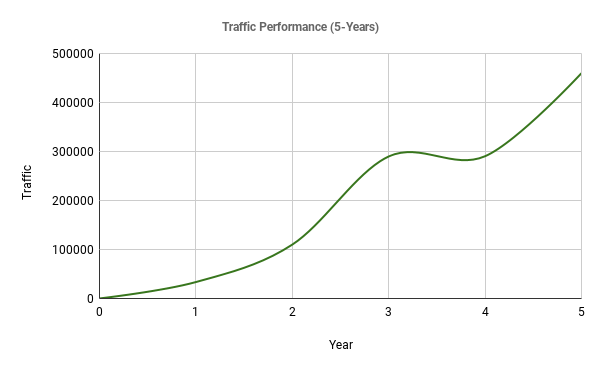
Make sure your manufacturing company is showing up when it matters whether it’s for a new customer or new employee.
We deliver innovative website, SEO, and content strategies – grounded in timeless marketing principles – to help manufacturing companies maintain a strong reputation and drive new business.
The global manufacturing industry is projected to reach approximately $8.8 trillion in value added by 2024, driven by advancements in automation, smart technologies, and increasing consumer demand
To capitalize on this growth, it’s essential for manufacturing companies to establish a robust online presence through a well-designed website and effective SEO strategies. This approach enhances visibility, attracts prospective clients, and ensures your business stands out in an increasingly competitive manufacturing landscape.
A 2024 survey revealed that 95% of customers read online reviews before buying a product, with reviews influencing 93% of purchasing decisions. This underscores the critical importance of a strong online presence for manufacturing businesses. Implementing effective SEO strategies can significantly enhance visibility, drive targeted traffic, and convert inquiries into sales.
Why do manufacturing companies need SEO?
Search Engine Optimization (SEO) is essential for manufacturing companies aiming to enhance their online presence and attract potential clients.
By optimizing their websites, manufacturers can ensure they appear prominently in search engine results, making it easier for businesses and consumers to discover and engage with their products and services.
People will find your website by:
- Reading reviews of your business before submitting an application.
- Try to find reports or other industry news about your business.
- Try to see what services you offer and what your rates may be.
- Find a manufacturing or packaging partner for their new product or service.
A robust SEO strategy ensures that a manufacturing company’s website ranks highly in search results, increasing the likelihood that potential clients will find and consider their offerings.
What does a manufacturing SEO strategy look like?
To enhance their online presence and attract potential clients, manufacturing companies should focus on the following key SEO areas:
Technical SEO: Ensure your website is technically sound with fast load times, mobile optimization, and proper indexing by search engines. This is crucial for providing a seamless user experience and improving search engine rankings.
Content Strategy: Create informative, engaging content that addresses the needs and interests of your target audience. This includes blog posts, whitepapers, case studies, and resources that showcase your expertise and build trust in your brand.
Local SEO: Optimize your online presence to attract local clients by managing your Google Business Profile, ensuring consistent NAP (Name, Address, Phone Number) information across directories, and encouraging customer reviews to boost local search visibility.
Reputation Management: Actively monitor and manage online reviews and feedback to maintain a positive brand image. Responding to customer reviews and addressing concerns promptly can enhance your company’s credibility and trustworthiness.
TechAudits can help you sell more products.
Get started with managed SEO services today.
We help all types of manufacturing companies improve their reputation, get found via organic search and sell more products.
Automotive
Electronics
Textiles
Machinery & Equipment
Construction Materials
Packaging & Containers
Food Processing
Pharmaceutical
Aerospace
Have questions about working with an SEO company?
We have answers. The team behind TechAudits has been working in or around the education space for the better part of the last 10 years. We have experience helping manufacturing brands improve local rankings, generate more jobs and hire top talent.
We are certain that if you partner up with TechAudits you will see a strong return for all of the effort.
SEO is the practice of optimizing your online presence to enhance visibility in search engine results and attract targeted traffic.
You should expect:
- Sustainable Growth: SEO helps drive qualified, long-term traffic to your site, supporting sustained growth in new customers.
- Targeted Traffic: Reach potential customers actively searching for your products.
- Cost-Effective Marketing: Establishing SEO as a marketing channel provides a strong return on investment compared to other advertising methods.
- Increased Brand Awareness and Credibility: High search rankings help build trust and position your brand as a leader in your market.
Search Engine Optimization (SEO) for manufacturing companies presents unique challenges and opportunities compared to other industries. Key distinctions include:
Technical Content and Industry Jargon: Manufacturing websites often feature specialized products and services that require detailed technical descriptions. SEO strategies must incorporate industry-specific terminology to attract and engage a knowledgeable audience.
Long Sales Cycles and B2B Focus: Manufacturing typically involves longer sales cycles and a focus on business-to-business (B2B) transactions. SEO efforts should prioritize content that nurtures leads over time, such as whitepapers, case studies, and detailed product specifications.
Local and Global Reach: Manufacturers may target both local clients and international markets. SEO strategies need to balance local SEO practices, like optimizing for regional keywords and managing local business listings, with broader efforts to reach a global audience.
Emphasis on Technical SEO: Given the complexity of manufacturing websites, technical SEO aspects such as site speed, mobile optimization, and structured data implementation are critical to ensure optimal search engine indexing and user experience.
Regulatory Compliance and Certifications: Manufacturing industries often adhere to strict regulations and standards. SEO content must accurately reflect these certifications and compliance measures to build trust and credibility with potential clients.
By addressing these specific factors, manufacturing companies can develop effective SEO strategies that enhance online visibility, attract targeted traffic, and establish authority within the industry.
Reputation management is crucial for manufacturing companies due to several key factors:
Building Trust and Credibility: A positive reputation fosters trust among clients and partners, significantly influencing their purchasing decisions. In the manufacturing sector, where quality and reliability are paramount, businesses are more likely to engage with companies they perceive as reputable.
Attracting and Retaining Talent: A strong corporate reputation makes a company an attractive workplace, aiding in talent acquisition and reducing turnover rates. Conversely, a tarnished image can lead to disengagement among existing employees and deter potential candidates.
Investor Confidence: Companies with a good reputation tend to have higher stock prices and greater investor confidence. A positive reputation can lead to increased customer loyalty and higher sales, providing a significant edge in the marketplace.
Customer Retention and Referrals: Satisfied customers are more likely to return and recommend the company to others. A solid reputation contributes to ongoing growth through repeat business and word-of-mouth referrals.
Crisis Management: Effective reputation management enables manufacturing companies to address negative feedback promptly, mitigating potential damage and demonstrating a commitment to customer satisfaction and transparency.
By actively managing their reputation, manufacturing companies can build trust, enhance their market position, and ensure long-term success in client acquisition and retention.
Your optimization efforts will pay off, but the results may not be immediately visible. While you might notice some initial progress within a couple of months, significant changes — like climbing up the search rankings — often takes around three to six months.
Developing a robust SEO strategy is essential for manufacturing companies aiming to enhance their online visibility and attract potential clients. Key focus areas include:
Keyword Research: Identify terms that potential clients use when searching for your products or services. This involves targeting both broad and long-tail keywords to capture various search intents, from general manufacturing solutions to specific product inquiries.
On-Page Optimization: Ensure that each webpage is optimized with relevant keywords in title tags, meta descriptions, headers, and content. This enhances search engine understanding and improves user experience, making it easier for clients to find and navigate your site.
Technical SEO: Address technical aspects such as site speed, mobile responsiveness, secure connections (HTTPS), and proper indexing. A technically sound website ensures that search engines can crawl and index your pages effectively, leading to better rankings.
Content Strategy: Create high-quality, engaging content that provides value to your audience. This includes detailed product descriptions, informative blog posts, whitepapers, case studies, and multimedia content that can attract and retain clients, establishing your company as an industry authority.
Local SEO: Optimize your online presence to attract local clients. This involves managing your Google Business Profile, ensuring consistent NAP (Name, Address, Phone Number) information across directories, and encouraging client reviews to boost local search visibility.
Link Building: Acquire high-quality backlinks from reputable websites to enhance your site’s authority. This can be achieved through partnerships, sponsorships, guest blogging, and creating shareable content that others want to link to.
User Experience (UX): Focus on providing a seamless and enjoyable experience for users. This includes intuitive navigation, fast load times, clear calls-to-action, and a responsive design that adapts to various devices, all of which can lead to higher engagement and conversions.
Analytics and Performance Tracking: Utilize tools like Google Analytics and Google Search Console to monitor key performance indicators (KPIs) such as organic traffic, bounce rates, conversion rates, and keyword rankings. Regular analysis allows for data-driven decisions and continuous optimization of your SEO strategy.
By focusing on these areas, manufacturing companies can develop a comprehensive SEO strategy that enhances online visibility, attracts targeted traffic, and drives business growth.
Measuring the success of a manufacturing company’s SEO campaign involves tracking key performance indicators (KPIs) that reflect improvements in online visibility, user engagement, and lead generation. Essential metrics to monitor include:
Organic Traffic: Evaluate the number of visitors arriving at your website through unpaid search results. An increase in organic traffic indicates enhanced visibility and effective keyword targeting.
Keyword Rankings: Monitor your website’s positions in search engine results pages (SERPs) for targeted keywords. Improved rankings suggest successful optimization efforts and greater potential for attracting relevant traffic.
Click-Through Rate (CTR): Assess the percentage of users who click on your website link after seeing it in search results. A higher CTR indicates that your meta titles and descriptions are compelling and relevant to search queries.
Conversion Rate: Measure the proportion of website visitors who complete desired actions, such as requesting a quote, contacting sales, or downloading a product catalog. An increasing conversion rate signifies that your site effectively engages visitors and encourages them to take action.
Lead Quality and Volume: Track the number and quality of leads generated through your website. High-quality leads that align with your target customer profile indicate that your SEO efforts are attracting the right audience.
Customer Acquisition Cost (CAC): Calculate the cost associated with acquiring a new customer through SEO efforts. A lower CAC suggests that your SEO strategy is cost-effective in generating new business.
Lifetime Value (LTV) of Customers: Assess the total revenue expected from a customer over their relationship with your company. A higher LTV indicates that your SEO efforts are attracting customers who provide long-term value.
Return on Investment (ROI): Calculate the financial return generated from your SEO efforts relative to the costs incurred. A positive ROI demonstrates the profitability and effectiveness of your SEO strategy.
Regularly analyzing these metrics provides valuable insights into the performance of your manufacturing company’s SEO campaign, enabling data-driven decisions to optimize strategies and achieve business objectives.
TechAudits has helped many brands establish their place in organic results, both local and national.
See how TechAudits has driven significant revenue and value for our clients by checking out our case studies.
Read Case Studies